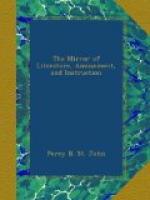One of the points of view in which the Author of Waverley is first presented to us is, as a delineator of human character. When we regard him in this light, we are struck at once by the fertility of his invention, and the force, novelty, and fidelity of his pictures. He brings to our minds, not abstract beings, but breathing, acting, speaking individuals. Then what variety! What originality! What numbers! What a gallery has he set before us! No writer but Shakspeare ever equalled him in this respect. Others may have equalled, perhaps surpassed him, in the elaborate finishing of some single portrait (witness the immortal Knight and Squire of Cervantes, Fielding’s Adams, and Goldsmith’s Vicar); or may have displayed, with greater skill, the morbid anatomy of human feeling—and our slighter foibles and finer sensibilities have been more exquisitely touched by female hands—but none save Shakspeare has ever contributed so largely, so valuably, to our collection of characters;—of pictures so surprisingly original, yet, once seen, admitted immediately to be conformable to Nature. Nay, even his anomalous beings are felt to be generally reconcilable with our code of probabilities; and, as has been said of the supernatural creations of Shakspeare, we are impressed with the belief, that if such beings did exist, they would be as he has represented them.—Edinburgh Review.
* * * * *
MEN COMPARED WITH BEES.
(From a continuation of “the Indicator,” by Leigh Hunt.)
It has been thought, that of all animated creation, the bees present the greatest moral likeness to man; not only because they labour and lay up stores, and live in communities, but because they have a form of government and a monarchy. Virgil immortalized them after a human fashion. A writer in the time of Elizabeth, probably out of compliment to the Virgin Queen, rendered them dramatis personae, and gave them a whole play to themselves. Above all, they have been held up to us, not only as a likeness, but as “a great moral lesson;” and this, not merely with regard to the duties of occupation, but the form of their polity. A monarchical government, it is said, is natural to man, because it is an instinct of nature: the very bees have it.
It may be worth while to inquire a moment into the value of this argument; not as affecting the right and title of our Sovereign Lord King William the Fourth (whom, with the greatest sincerity, we hope God will preserve!), but for its own sake, as well as for certain little collateral deductions. And, in the first place, we cannot but remark how unfairly the animal creation are treated, with reference to the purposes of moral example. We degrade or exalt them, as it suits the lesson we desire to inculcate. If we rebuke a drunkard or a sensualist, we think we can say nothing severer to him than to recommend him




